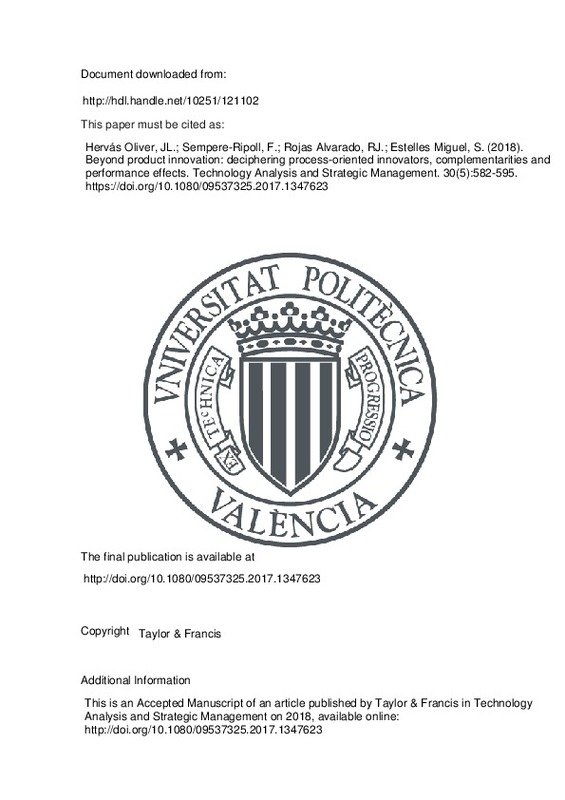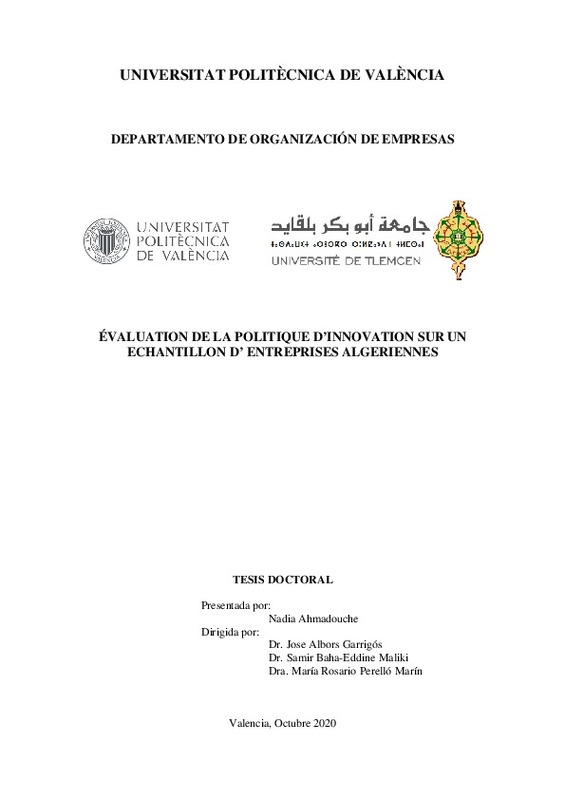JavaScript is disabled for your browser. Some features of this site may not work without it.
Buscar en RiuNet
Listar
Mi cuenta
Estadísticas
Ayuda RiuNet
Admin. UPV
Organizational learning capability and open innovation
Mostrar el registro sencillo del ítem
Ficheros en el ítem
| dc.contributor.author | Peris-Ortiz, Marta
|
es_ES |
| dc.contributor.author | Devece Carañana, Carlos Alberto
|
es_ES |
| dc.contributor.author | Navarro-García, Antonio
|
es_ES |
| dc.date.accessioned | 2020-01-11T21:01:43Z | |
| dc.date.available | 2020-01-11T21:01:43Z | |
| dc.date.issued | 2018 | es_ES |
| dc.identifier.issn | 0025-1747 | es_ES |
| dc.identifier.uri | http://hdl.handle.net/10251/134316 | |
| dc.description.abstract | [EN] Purpose The purpose of this paper is to investigate the relationship between open innovation (OI) and radical and incremental innovation success in knowledge-based companies. The company's human resources and organizational learning capability are considered as the fundamental nexus of this relationship. Design/methodology/approach At the conceptual level, the paper analyzes the relationships between dynamic capabilities and OI and between OI and innovation success. Fuzzy-set qualitative comparative analysis (fsQCA) was used to study how innovation is implemented in 29 companies. Findings FsQCA identifies combinations of factors that facilitate incremental innovations. These combinations reveal the path to implementing company policies that enable incremental innovation and foster radical innovation. Research limitations/implications The nature of the study sample means that the findings should be generalized with precaution. The most valuable implication is the identification of combinations of factors that help companies manage innovation. Originality/value Scarce literature links organizational learning factors and OI to different types of innovation. The use of fsQCA to analyze the cases also marks a breakthrough in the innovation literature. | es_ES |
| dc.language | Inglés | es_ES |
| dc.publisher | Emerald | es_ES |
| dc.relation.ispartof | Management Decision | es_ES |
| dc.rights | Reconocimiento - No comercial (by-nc) | es_ES |
| dc.subject | Open innovation | es_ES |
| dc.subject | Process innovation | es_ES |
| dc.subject | Organizational learning | es_ES |
| dc.subject | Radical innovation | es_ES |
| dc.subject | Qualitative comparative analysis | es_ES |
| dc.subject | Incremental innovation | es_ES |
| dc.subject.classification | ORGANIZACION DE EMPRESAS | es_ES |
| dc.title | Organizational learning capability and open innovation | es_ES |
| dc.type | Artículo | es_ES |
| dc.identifier.doi | 10.1108/MD-02-2017-0173 | es_ES |
| dc.rights.accessRights | Abierto | es_ES |
| dc.contributor.affiliation | Universitat Politècnica de València. Departamento de Organización de Empresas - Departament d'Organització d'Empreses | es_ES |
| dc.description.bibliographicCitation | Peris-Ortiz, M.; Devece Carañana, CA.; Navarro-García, A. (2018). Organizational learning capability and open innovation. Management Decision. 56(6):1217-1231. https://doi.org/10.1108/MD-02-2017-0173 | es_ES |
| dc.description.accrualMethod | S | es_ES |
| dc.relation.publisherversion | https://doi.org/10.1108/MD-02-2017-0173 | es_ES |
| dc.description.upvformatpinicio | 1217 | es_ES |
| dc.description.upvformatpfin | 1231 | es_ES |
| dc.type.version | info:eu-repo/semantics/publishedVersion | es_ES |
| dc.description.volume | 56 | es_ES |
| dc.description.issue | 6 | es_ES |
| dc.relation.pasarela | S\366027 | es_ES |
| dc.description.references | Chesbrough, H. and Bogers, M. (2014), “Explicating open innovation: clarifying an emerging paradigm for understanding innovation”, in Chesbrough, H., Vanhaverbeke, W. and West, J. (Eds), Open Innovation: New Frontiers and Applications, Oxford University Press, Oxford, pp. 3-28. | es_ES |
| dc.description.references | Grant, R.M. (2001), “Knowledge and organizations”, in Nonaka, I. and Teece, D.J. (Eds), Managing Industrial Knowledge: Creation, Transfer and Utilization, Sage, London, pp. 145-169. | es_ES |






![PDF file [Pdf]](/themes/UPV/images/pdf.png)
![[Cerrado]](/themes/UPV/images/candado.png)



